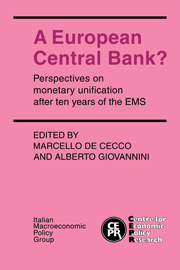Book contents
- Frontmatter
- Contents
- List of figures
- List of tables
- Preface
- List of conference participants
- 1 Does Europe need its own central bank?
- 2 Monetary policy, capital controls and seigniorage in an open economy
- 3 Seigniorage in Europe
- 4 Factor mobility, uncertainty and exchange rate regimes
- 5 Management of a common currency
- 6 The tastes of European central bankers
- 7 The costs and benefits of a European currency
- 8 The monetary unification process in nineteenth-century Germany: relevance and lessons for Europe today
- 9 The establishment of a central bank: Italy in the nineteenth century
- 10 The founding of the Fed and the destabilization of the post-1914 US economy
- 11 Panel discussion on the prospects for a European Central Bank
- Index
2 - Monetary policy, capital controls and seigniorage in an open economy
Published online by Cambridge University Press: 05 February 2012
- Frontmatter
- Contents
- List of figures
- List of tables
- Preface
- List of conference participants
- 1 Does Europe need its own central bank?
- 2 Monetary policy, capital controls and seigniorage in an open economy
- 3 Seigniorage in Europe
- 4 Factor mobility, uncertainty and exchange rate regimes
- 5 Management of a common currency
- 6 The tastes of European central bankers
- 7 The costs and benefits of a European currency
- 8 The monetary unification process in nineteenth-century Germany: relevance and lessons for Europe today
- 9 The establishment of a central bank: Italy in the nineteenth century
- 10 The founding of the Fed and the destabilization of the post-1914 US economy
- 11 Panel discussion on the prospects for a European Central Bank
- Index
Summary
Introduction
Several European countries rely heavily on inflation tax revenues to finance their expenditures. Seigniorage accounted for between 6 and 12% of government revenues in Greece, Italy, Portugal, and Spain in the period 1979–86 (in contrast to generally less than one percent in most of the rest of Western Europe over the same period). These countries argue that reliance on the inflation tax is made necessary by a poorly developed tax base for regular taxes. The potential loss of seigniorage as a revenue source under alternative monetary and capital market arrangements is therefore a prime concern to these countries in analysing such arrangements. For example, the loss of revenues from a decreased inflation rate is crucial in a decision by some of these countries of whether or not to join the EMS.
A look at the data on revenue from money creation reveals that the issue is more complex than simply the revenue loss from reducing the inflation rate. The four high-seigniorage countries not only have higher inflation rates than their Northern neighbours, but have significantly higher monetary bases as well. (See Table 2.1, based on Giavazzi, 1988.) Disaggregating the monetary base, one sees that the significant difference is not in currency to GDP ratios, but in bank reserves (relative to GDP) which are an order of magnitude higher. The last two columns of the table explain why this is so.
- Type
- Chapter
- Information
- A European Central Bank?Perspectives on Monetary Unification after Ten Years of the EMS, pp. 13 - 52Publisher: Cambridge University PressPrint publication year: 1989
- 15
- Cited by



